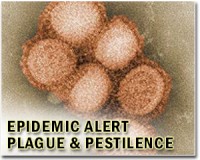 |
Washington (AFP) Nov 30, 2010 Wealthy nations boosted funding for health programs in poor countries more than fourfold between 1990 and 2010, thanks largely to greater awareness of the need to fight HIV/AIDS, a report released Tuesday said. Research by the University of Washington's Institute for Health Metrics and Evaluation (IHME) found that development assistance for health programs jumped from 5.66 billion dollars in 1990 to a projected 26.87 billion dollars this year. Spending on HIV/AIDS programs was 6.16 billion dollars, or nearly a quarter of the total funding, said the report released on the eve of World AIDS Day. The AIDS pandemic, which has claimed some 25 million lives since the immune deficiency disease was first reported in 1981, is one of the reasons that funding from wealthy nations for global health programs has gone up sharply, Chris Murray, the lead author of the report, told AFP. "Until the HIV epidemic came along, we didn't have this sudden explosion of funding for global health," Murray said. The surge in funding for health in developing countries was fueled in part by a sense of "moral outrage felt by many people in the West at the fact that if you had money, you could get this miraculous triple-drug treatment for HIV," but the same treatment was not available in poor countries. "That and the presence of highly effective AIDS activism and advocacy groups has been a big driver in the expansion of global health funding in high-income countries," he said. Countries in sub-Saharan Africa, the part of the world hardest hit by AIDS, received the largest chunk of health aid in 2008 -- 6.92 billion dollars, or 29 percent of the total. Most of the money went to HIV/AIDS programs. In 1990, sub-Saharan Africa got around 10 percent of global health aid. Malaria and tuberculosis got just a third of the funding that HIV/AIDS got in 2008, and funding for maternal and child health was around half as much as for HIV/AIDS. Malaria claimed nearly one million lives, mostly among African children, in 2008, and tuberculosis killed 1.7 million people last year, with the highest toll in Africa, according to the World Health Organization. Some 300,000 mothers still die each year and more than seven million children die before the age of five, Murray said. AIDS-related deaths are estimated at about 1.8 million globally last year by the UN agency for the disease. Many of the deaths were from tuberculosis and 1.3 million victims were in Africa. But expanded access to HIV/AIDS treatment in sub-Saharan Africa has dramatically cut deaths from the disease, according to a UN report released last week. An estimated 320,000 fewer people die of HIV-related causes in 2009 in sub-Saharan Africa than in 2004, when the region began to dramatically scale up access to anti-AIDS drugs, according to the United Nations AIDS agency's 2010 global report on the epidemic. Murray said the IHME report, which analyzed data from 1990-2007 and used government budgets, spending patterns and other data to project levels of global health funding through 2010, which were not available, was intended to spur debate about how to allocate development aid for health programs. "Our view is that good information, both on where the money goes and what are people's health problems, will trigger all sorts of debate and discussion in developed and developing countries, and this will lead to better decision-making -- without us having to write a prescription for it," he said.
Share This Article With Planet Earth
Related Links Epidemics on Earth - Bird Flu, HIV/AIDS, Ebola
 China AIDS death toll up nearly 20,000 in a year: report
China AIDS death toll up nearly 20,000 in a year: reportBeijing (AFP) Nov 29, 2010 The total number of reported AIDS deaths in China has jumped by nearly 20,000 since an official estimate last year, state media said Monday as Beijing vowed to step up efforts to curb its spread. Deaths linked to Acquired Immune Deficiency Syndrome (AIDS) since its emergence in China in the 1980s reached 68,315 by the end of October, state television said, citing figures from the health mini ... read more |
|
| The content herein, unless otherwise known to be public domain, are Copyright 1995-2010 - SpaceDaily. AFP and UPI Wire Stories are copyright Agence France-Presse and United Press International. ESA Portal Reports are copyright European Space Agency. All NASA sourced material is public domain. Additional copyrights may apply in whole or part to other bona fide parties. Advertising does not imply endorsement,agreement or approval of any opinions, statements or information provided by SpaceDaily on any Web page published or hosted by SpaceDaily. Privacy Statement |